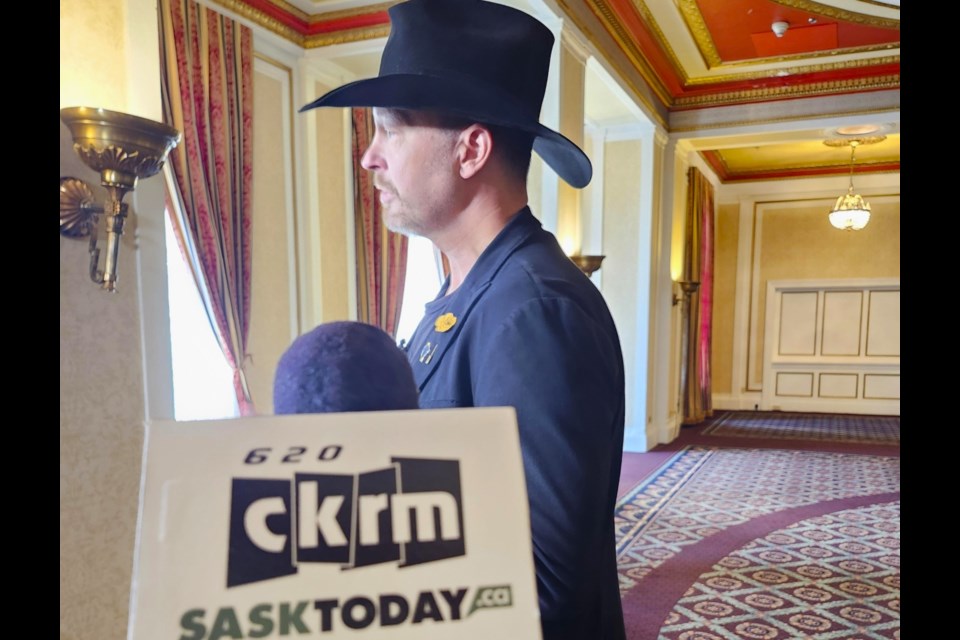SASKATOON — A documentary and a trip to Cambodia became a life-changing experience for Paul Brandt, multi-award-winning country music artist, who organized the annual Maddison Sessions summit, and his wife, Elizabeth Peterson. The new knowledge about human trafficking left its mark on the family and motivated them to act.
The latest edition of the summit, dedicated to combating and spreading awareness about human trafficking, opened on April 28 and will continue through May 1 at Delta Hotels Bessborough. At the opening events, Brandt was joined by Saskatoon Police Service Inspector Erin Coates, Montreal Police Commander Frédéric Martineau, and Nova Scotia RCMP Sgt. David Lane.
Brandt said he brought The Maddison Sessions to the city to highlight the horrors of human trafficking. The summit is named after Maddison Fraser, a Nova Scotia woman who became a human trafficking victim and died in a car accident in 2015.
Despite Fraser’s tragic ending, Brandt said there are also inspiring stories from survivors who reclaimed their lives with help from law enforcement members — such as Lane from the Serious and Organized Crime Unit — and various organizations that educate the public on identifying the signs of human trafficking victims.
“One of the first things Sgt. Lane asks survivors, when he's speaking to them, is what are your dreams, and how can we help you get there? That position of hope is something we often see in many stories. When we can identify the signs, help a person,” said Brandt, who is also the CEO of the facilitative organization #NotInMyCity, which organizes the summit.
"There's one individual I'm thinking about, Cassandra, who will join us here. She now runs Native Trafficking in Ontario. She speaks all over the world and is a leader in helping law enforcement and the general public understand and identify people who might be human trafficking victims. To me, that is a beautiful story of transformation."
He added that visiting Cambodia, where the documentary he and his wife had watched was filmed, led him to start #NotInMyCity.
“It was one of the darkest places that I've ever been. A lot of different details I could give you, but the main one would be when I met a five-year-old who was being trafficked six to eight times a night on that street. As a father, I asked myself, ‘How will I teach my son to respect and care about people?’” said Brandt, during an interview with reporters.
“When my daughter is old enough — you know, 13 years old is the average age of being trafficked, she's now 14 — to ask me, ‘Daddy, what did you do when you saw that little girl?’ I want to give her a chance. I think all of us have some knowledge about human trafficking. When I came back to Canada, I met with [human trafficking] victims.”
He added that learning that human trafficking also happens in communities across Canada is something he never expected, and meeting victims and hearing their stories opened his eyes to the horrors of the inhumane crime.
“It was very real. All those children. It was very shocking to me, but I have to tell you that trafficking is a thing in Canada, and there's something that can be done to combat it,” said Brandt.
#NotInMyCity held the first Maddison Sessions in 2023 in Lake Louise, Alta. Kelowna, B.C., hosted last year’s event. The Alberta and Saskatchewan governments each contributed $100,000 to the summit.
Complex investigations
Lane said there is cross-border, interagency co-operation and interoperability in investigating human trafficking cases. However, technological advancements and an informed public are elements that make things easier for law enforcers like him.
“There are so many complexities, I'm unsure where to start. When we begin our investigations, it's often because someone has seen something or a red flag has popped up, which gets us involved. We can look into it further and peel back those layers. I'd like to have more of these sessions, more interoperability, more training, more access to technology,” said Lane.
He added the public needs to understand that anybody can be trafficked — whether in sexual or labour-related activities — regardless of age or ethnicity.
“One of the biggest things we find sometimes when we deal with families is that they say, I never thought it could happen to us. We try not to paint a picture of a victim or a trafficker because they come in all shapes and sizes. Focusing on what they are is less important than the indicators,” said Lane.
“We want people to be able to identify anybody as a victim or a trafficker. With labour trafficking, again, it comes in all different forms. I would say the biggest thing that we want to do is educate ourselves on indicators, so that anyone who is trafficked, either in the sex trade or labour trafficking, we can help them.”




